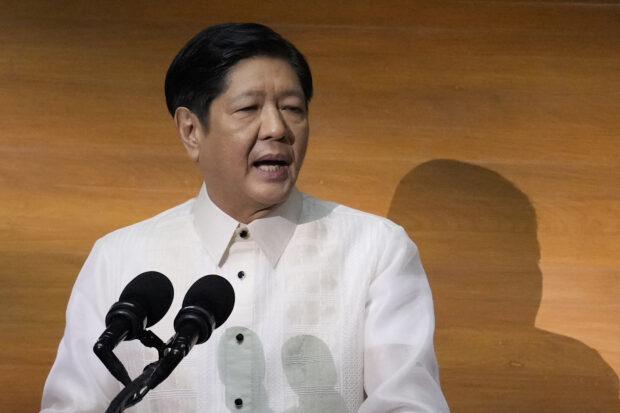Biz groups back Marcos’ long weekend policy

President Ferdinand Marcos Jr. (File photo by AARON FAVILA / Associated Press)
MANILA, Philippines — Hooray for long weekends!
Two of the country’s largest business groups voiced their support for the Marcos administration’s plan to promote extended weekends.
The Philippine Chamber of Commerce and Industry (PCCI), the country’s largest business organization, said that for a consumption-driven economy like the Philippines, long weekends provide benefits such as more opportunities for families for their recreation and social interaction.
“More time with family and friends can boost well-being and, indirectly, enhance their productivity,” PCCI president Enunina Mangio said in a statement on Sunday.
She added that long weekends encourage domestic travel, which should in turn spur increased spending on tourism that trickles down to the grassroots.
“This also adds value to other sectors including retail, food and service sectors,” Mangio said.
The Federation of Philippine Industries (FPI) agreed that long weekends lead to increased consumer spending, which is good for businesses.
“If you compress the rest days, it will be conducive for people to spend money. And when people spend more money, it will mean additional income,” FPI chair Jesus Arranza said in an interview.
“We also know that when there are long weekends, people travel with their families and go to resorts and other similar places,” he added.
Plan vacations
President Ferdinand Marcos Jr., in a post on Instagram last Thursday, said in Filipino: “Let’s take advantage of the long weekends in 2024 together with our families and loved ones!”
“We should plan well our work and vacation for a productive and bountiful year,” he added.
Under Proclamation No. 368 signed by the President in October 2023, there will be four long weekends this year, with the first one on March 28, Maundy Thursday, until April 1, Easter Sunday.
Another long weekend is set for Aug. 24 (Saturday) until Aug. 26 or National Heroes Day (Monday).
Then there’s the period of All Saints’ Day on Nov. 1 (Friday), All Souls’ Day on Nov. 2 (Saturday) and Nov. 3 (Sunday).
The fourth will be during the holiday season, starting from Dec. 28 (Saturday) and including Dec. 30, Rizal Day (Monday), and Dec. 31 (Tuesday), the last day of the year which is considered a special nonworking day.
‘Labor costs’
But while PCCI welcomed the longer weekends, Mangio said the government should “balance” this move by not increasing the number of total holidays.
“There are already eighteen scheduled regular holidays in the Philippines for 2024 and increasing this number will undoubtedly increase labor costs for industries, especially for manufacturing and business process outsourcing,” she said, adding that this will lead to an additional burden for these sectors and compromise their competitiveness.
